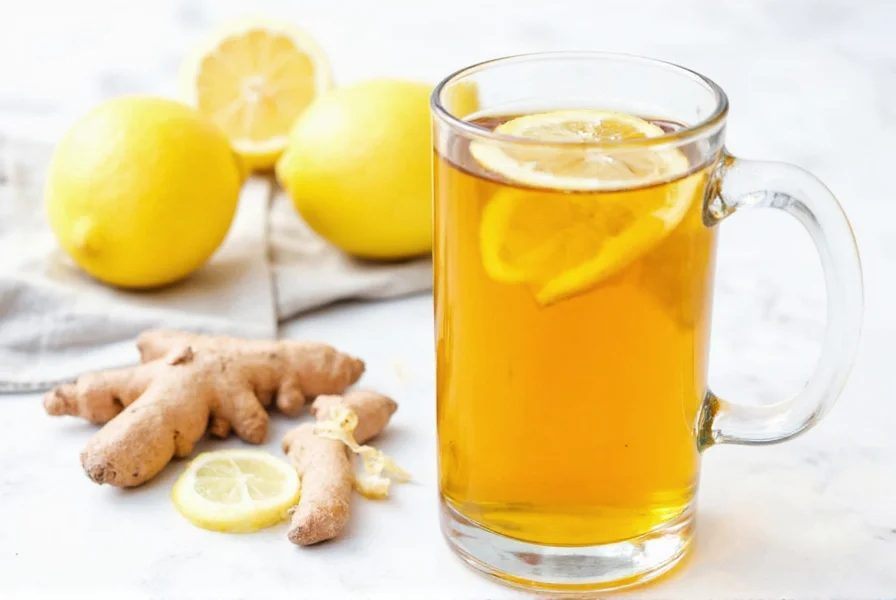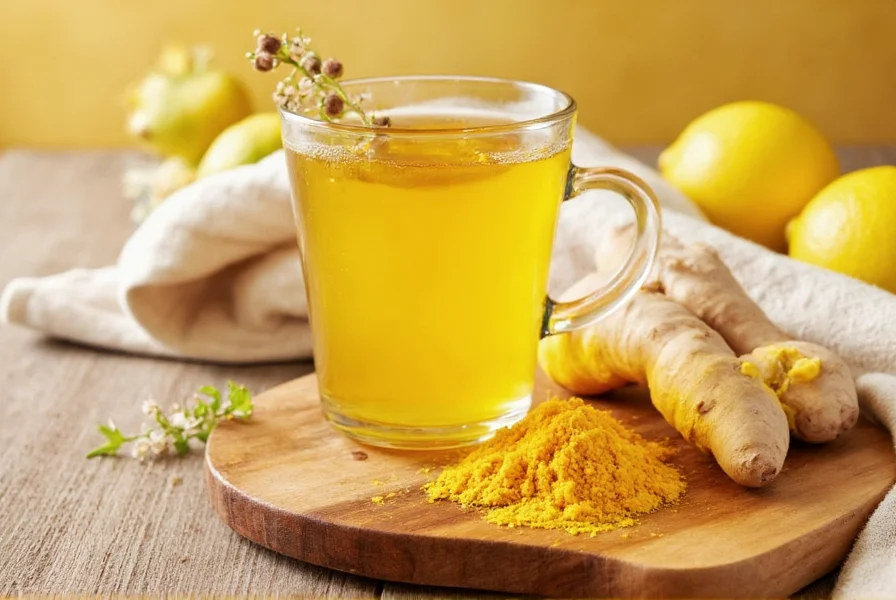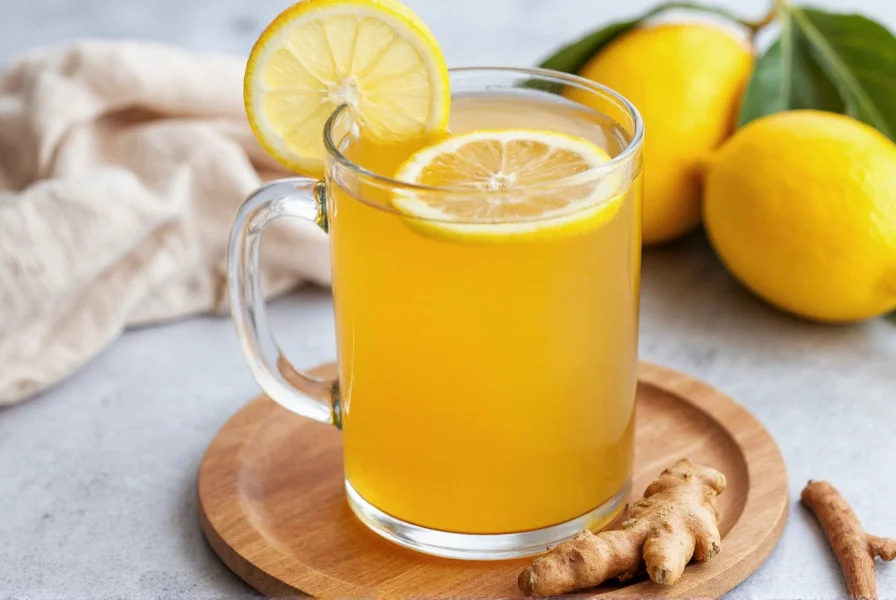The Science Behind Lemon Ginger Turmeric Tea Benefits
When examining lemon ginger turmeric tea health benefits, research reveals specific mechanisms worth understanding. Turmeric contains curcumin, which multiple studies show has significant anti-inflammatory effects. A 2022 meta-analysis in Nutrients confirmed curcumin's ability to reduce inflammatory markers like C-reactive protein. Ginger contributes gingerols that support digestive health and nausea relief, particularly effective for morning sickness according to Mayo Clinic research. Lemon adds vitamin C and flavonoids that enhance curcumin absorption by up to 2000% as demonstrated in a Journal of Food Science study.
However, it's crucial to understand the limitations. Most research examines concentrated extracts rather than tea preparations. The bioavailability of curcumin in homemade tea remains relatively low without black pepper (piperine) to enhance absorption. This explains why does lemon ginger turmeric tea help with inflammation yields mixed results in casual consumption versus clinical studies.
Authentic Preparation Method for Maximum Benefits
Creating effective homemade lemon ginger turmeric tea requires specific techniques often overlooked in casual recipes. The traditional Ayurvedic preparation method involves:
| Ingredient | Measurement | Preparation Tip |
|---|---|---|
| Fresh turmeric root | 1-inch piece | Grate rather than slice for maximum curcumin release |
| Fresh ginger root | 1-inch piece | Crush before adding to water |
| Fresh lemon | Half, juiced | Add after steeping to preserve vitamin C |
| Black pepper | 1/8 teaspoon | Essential for curcumin absorption |
| Honey (optional) | 1 teaspoon | Add after cooling to 110°F to preserve enzymes |
Bring 2 cups of water to boil, add grated turmeric and crushed ginger, then simmer covered for 10-15 minutes. Remove from heat, add lemon juice and black pepper. Avoid boiling lemon juice as this destroys heat-sensitive vitamin C. This preparation method maximizes the lemon ginger turmeric tea for immunity benefits while creating a balanced flavor profile.

Safety Considerations and Potential Side Effects
While generally safe, lemon ginger turmeric tea side effects require consideration for certain populations. Turmeric may interact with blood thinners like warfarin, potentially increasing bleeding risk. The National Center for Complementary and Integrative Health advises caution for individuals with gallbladder disease, as turmeric may worsen symptoms. Ginger in high quantities (more than 4 grams daily) can cause heartburn or interact with diabetes medications.
Recommended daily limits:
- Turmeric: Up to 500-2,000 mg of curcumin (approximately 1-3 teaspoons of fresh root)
- Ginger: Up to 4 grams total from all sources
- Lemon: No specific limit, but excessive consumption may erode tooth enamel
Comparing Lemon Ginger Turmeric Tea to Other Herbal Blends
Understanding lemon ginger turmeric tea vs regular ginger tea reveals important distinctions. The addition of turmeric significantly increases anti-inflammatory potential but requires proper preparation for bioavailability. Compared to store-bought versions, homemade tea contains higher concentrations of active compounds without preservatives or artificial flavors.
When evaluating does lemon ginger turmeric tea help with weight loss, research shows modest metabolic effects at best. A 2021 study in Complementary Therapies in Medicine found participants drinking this tea daily showed slightly better weight management outcomes than controls, but the effect was minimal without dietary changes. The primary benefits remain in digestive support and inflammation reduction rather than significant weight loss.

Evidence-Based Usage Recommendations
For optimal results with lemon ginger turmeric tea for colds, consume at first signs of illness. The combination supports immune function through multiple pathways: vitamin C from lemon, anti-nausea properties from ginger, and immune-modulating effects from turmeric. However, it should complement rather than replace medical treatment for serious conditions.
Timing matters for maximum benefit. Consuming this tea 20-30 minutes before meals supports digestion, while evening consumption may interfere with sleep for sensitive individuals due to ginger's mild stimulating properties. The ideal how often to drink lemon ginger turmeric tea frequency is 1-2 cups daily for maintenance, potentially increasing to 3 cups during cold season or periods of inflammation.
Frequently Asked Questions
How long should I steep lemon ginger turmeric tea for maximum benefits?
Steep fresh turmeric and ginger in boiling water for 10-15 minutes to maximize curcumin and gingerol extraction. Add lemon juice after steeping to preserve vitamin C. Longer steeping beyond 15 minutes yields diminishing returns and may increase bitterness.
Can I drink lemon ginger turmeric tea while pregnant?
Moderate consumption (1 cup daily) of lemon ginger turmeric tea is generally considered safe during pregnancy, particularly for nausea relief. However, consult your healthcare provider first, as high doses of turmeric may stimulate uterine contractions. Avoid concentrated supplements during pregnancy.
Does lemon ginger turmeric tea interact with medications?
Yes, turmeric may interact with blood thinners (warfarin, aspirin), diabetes medications, and certain chemotherapy drugs. Ginger can also interact with blood thinners and high blood pressure medications. Consult your doctor before regular consumption if taking prescription medications.
How does black pepper enhance lemon ginger turmeric tea benefits?
Black pepper contains piperine, which increases curcumin absorption from turmeric by up to 2000% according to research in Planta Medica. Adding just 1/8 teaspoon of black pepper significantly improves the bioavailability of curcumin, making the anti-inflammatory benefits more effective.
Can lemon ginger turmeric tea help with arthritis pain?
Research shows modest benefits for arthritis symptoms. A 2020 study in Phytotherapy Research found participants consuming curcumin (the active compound in turmeric) experienced reduced pain scores compared to placebo. However, the concentration in tea is lower than clinical doses, so effects may be subtle. It should complement, not replace, medical treatment for arthritis.











 浙公网安备
33010002000092号
浙公网安备
33010002000092号 浙B2-20120091-4
浙B2-20120091-4